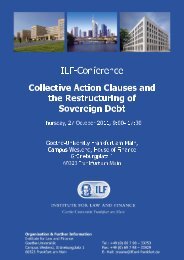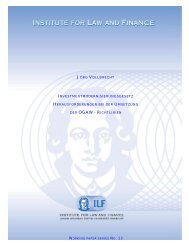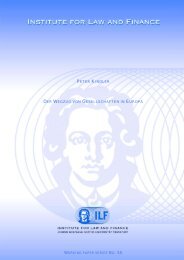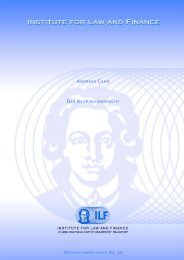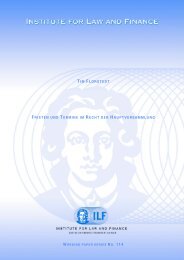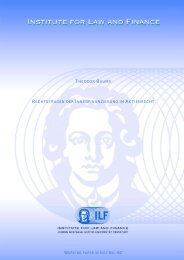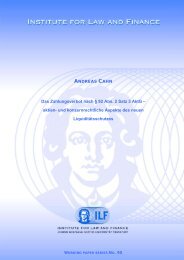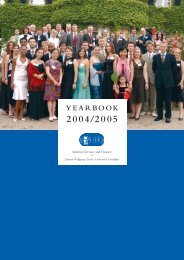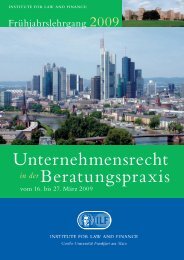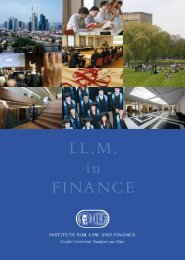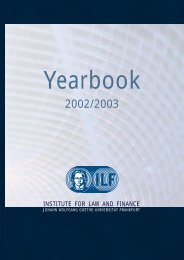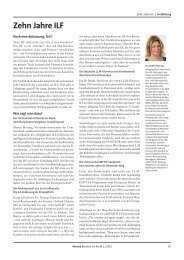Peter Werner [Kompatibilitätsmodus] - Institute For Law And Finance
Peter Werner [Kompatibilitätsmodus] - Institute For Law And Finance
Peter Werner [Kompatibilitätsmodus] - Institute For Law And Finance
Create successful ePaper yourself
Turn your PDF publications into a flip-book with our unique Google optimized e-Paper software.
Islamic Derivatives - <strong>Law</strong> Reform in<br />
Islamic Jurisdictions<br />
24 April 2012<br />
Conference on Islamic Banking and <strong>Finance</strong><br />
<strong>Institute</strong> for <strong>Law</strong> and <strong>Finance</strong><br />
Goethe University<br />
Frankfurt<br />
Dr <strong>Peter</strong> M. <strong>Werner</strong><br />
Senior Director<br />
ISDA<br />
pwerner@isda.org<br />
©2012 International Swaps and Derivatives Association, Inc.<br />
ISDA ® is a registered trademark of the International Swaps and Derivatives Association, Inc.
<strong>Law</strong> Reform and ISDA<br />
• The development and use of derivatives products has<br />
become ubiquitous spreading around the world<br />
• Effective risk management requires legal certainty. In<br />
the ISDA context this means:<br />
− Enforceability of derivatives contracts (ISDA Master<br />
Agreements)<br />
− Clarity of insolvency law and enforceability of<br />
netting provisions<br />
− Clarity regarding the treatment of collateral<br />
2
<strong>Law</strong> Reform and ISDA<br />
• Significant variation in national insolvency and property<br />
laws around the world affects the enforceability of<br />
derivatives transactions under ISDA’s netting and<br />
collateral agreements<br />
• ISDA’s law reform efforts aim at addressing these<br />
concerns, working with other multinational organizations<br />
as well as national authorities<br />
3
Financial Market <strong>Law</strong> Reform: Key<br />
Questions<br />
• Knowing where you stand: the practical value of increasing legal certainty<br />
• An abstract goal, but with concrete results: increased market<br />
confidence, more liquidity, greater financial stability<br />
• Key questions:<br />
− Will my agreement be respected and enforced by a court or<br />
arbitration tribunal?<br />
− Will foreign law governed contracts and foreign based counterparties<br />
be treated equally?<br />
− Will it be enforced as written, both before and after my counterparty’s<br />
insolvency?<br />
− How can I protect against the risk of my counterparty’s insolvency?<br />
• Early termination and close-out netting under a master<br />
agreement<br />
• Set-off rights<br />
• Financial collateral arrangements and other forms of security<br />
• Guarantees, letters of credit, insurance, credit derivatives<br />
4
ISDA’s <strong>Law</strong> Reform Efforts in<br />
Emerging Markets within EMEA<br />
• Since 1987 ISDA has been developing standard contracts,<br />
recommendations and model laws on netting and for collateral<br />
transactions<br />
−<br />
−<br />
−<br />
ISDA netting legislation initiatives in EMEA, LatAm, Asia-Pac<br />
ISDA Model Netting Act and Memorandum on Implementation of<br />
Netting Legislation (latest version published October 2007)<br />
ISDA Master Agreements and supplemental standard<br />
documentation<br />
• Focus countries in the EMEA region<br />
−<br />
−<br />
−<br />
CEE/SEE/CIS region<br />
Middle East and N. Africa (incl. Islamic version of the ISDA MA)<br />
Sub-Saharan Africa (ex-RSA): Mauritius, Nigeria, ECOWAS,<br />
SADC<br />
5
ISDA Netting Opinions 2011<br />
1. Anguilla<br />
2. Australia<br />
3. Austria<br />
4. Bahamas<br />
5. Barbados<br />
6. Belgium<br />
7. Bermuda<br />
8. Brazil<br />
9. B.V.I.<br />
10. Canada<br />
11. Cayman Islands<br />
12. Channel Islands - Guernsey<br />
13. Channel Islands - Jersey<br />
14. Chile<br />
15. Cyprus<br />
16. Czech Republic<br />
17. Denmark<br />
18. England<br />
19. Finland<br />
20. France<br />
21. Germany<br />
22. Greece<br />
23. Hong Kong<br />
24. Hungary<br />
25. Iceland<br />
26. India<br />
27. Indonesia<br />
28. Ireland<br />
29. Israel<br />
30. Italy<br />
31. Japan<br />
32. Luxembourg<br />
33. Malaysia<br />
34. Malta<br />
35. Mauritius<br />
36. Mexico<br />
37. Netherlands<br />
38. Curacao/St.Maarten<br />
(ex-NL Antilles)<br />
39. New Zealand<br />
40. Norway<br />
41. Peru<br />
42. Philippines<br />
43. Poland<br />
44. Portugal<br />
45. Scotland<br />
46. Singapore<br />
47. Slovakia<br />
48. Slovenia<br />
49. South Africa<br />
50. South Korea<br />
51. Spain<br />
52. Sweden<br />
53. Switzerland<br />
54. Taiwan<br />
55. Thailand<br />
56. Turkey<br />
57. United States<br />
6
Selected Int’l Legal Instruments<br />
• UNCITRAL Legislative Guide on Secured Transactions<br />
• UNCITRAL Legislative Guide on Insolvency<br />
• UN Convention on the Assignment of Receivables in International Trade<br />
• UN Convention on Contracts for the International Sale of Goods<br />
• Geneva Securities Convention<br />
• Hague Securities Convention<br />
• Hague Choice of Court Convention<br />
• EU Directive on Financial Collateral Arrangements + Amending Directive<br />
• EU Directives on Winding-up of Banks and Insurance Undertakings<br />
• EU Insolvency Regulation<br />
• EU Regulation (Rome I) on the <strong>Law</strong> Applicable to Contractual Obligations<br />
• EU Regulation (Brussels I) on the Recognition and Enforcement of Judgments in Civil<br />
and Commercial Matters<br />
• Other law reform initiatives affecting international finance (e.g. proposals for an EU<br />
instrument on netting)<br />
• New York Convention (arbitration in derivatives disputes; ISDA memos)<br />
• UNIDROIT global instrument on netting (Draft Principles published in early Apr 2012)<br />
10
Islamic Jurisdictions in the Middle<br />
East, N. Africa and the Far East<br />
• GCC region (primarily UAE, Bahrain, Qatar plus Saudi Arabia)<br />
• North Africa: Egypt, Morocco<br />
• Greater Middle East: Pakistan<br />
− Lack of proper netting legislation<br />
− Various other general legal issues relevant (general issues<br />
around contract, property and insolvency law plus conflict<br />
rules)<br />
• Far East: Malaysia, Indonesia<br />
• In the future? Kuwait, Oman, Jordan, Lebanon, Tunisia, Algeria,<br />
Nigeria plus Brunei, Indonesia<br />
• World Bank/UNCITRAL/OECD project on insolvency laws in MENA<br />
region<br />
11
Islamic Jurisdictions and the role of<br />
the Shariah<br />
• Shariah – Islamic principles and rules governing<br />
the conduct of both legal and personal matters<br />
(often referred to as “Shariah law”)<br />
• Applied in different ways and to varying extents<br />
in Islamic jurisdictions<br />
• Not a single, absolute set of universal rules<br />
• Contrast the law of a country with a non-national<br />
system of laws and principles<br />
12
Conflict of laws, rules and the Shariah<br />
• Can the Shariah be chosen as the governing law of<br />
a contract?<br />
– Shamil Bank of Bahrain EC v. Beximco<br />
Pharmaceuticals Limited & Others [2004]<br />
• “Subject to the principles of the Glorious<br />
Sharia, this Agreement shall be governed by<br />
and construed in accordance with the laws of<br />
England.”<br />
• Compliance with the Shariah and enforceability<br />
– The Investment Dar Company KSCC v. Blom<br />
Development Bank SAL [2009]<br />
13
Current Issues: UAE<br />
• No UAE-wide netting regime<br />
• Various regulators in charge of OTC derivatives: UAE Central Bank,<br />
Emirates Securities & Commodities Agency, DIFC/DFSA, ministries<br />
• Court system disparate among the seven emirates that constitute the UAE.<br />
Divergent judgments out of Dubai and Abu Dhabi courts.<br />
• ESCA proposal for introduction of netting regulations<br />
• ISDA meetings with UAECB, ESCA<br />
• ISDA proposal to DIFC/DFSA. Current DIFC regulations do not address<br />
close-out netting<br />
• Suggestions to develop an UAE-wide insolvency regime based on DIFC<br />
regulations (cf. Decree <strong>Law</strong> No 57/ 2009 of 14 December 2009)<br />
• Proposals to revise the federal Insolvency Code and Commercial<br />
Transactions <strong>Law</strong><br />
• Uncertainties regarding choice of foreign law governing the contract<br />
• Enforceability of foreign judgments doubtful. More positive re arbitral awards<br />
14
Current Issues: Qatar<br />
• Separation between “onshore” and “offshore” jurisdiction (QFC) to be lifted<br />
in the long run<br />
• No netting provisions in “onshore” legal system<br />
• QFC:<br />
− QFC Financial Services Regulations, Art.106, addresses wagering<br />
issues (different from Art.275 Penal Code)<br />
− Free choice of law governing the contract, Art.6-7 QFC Contract<br />
Regulations<br />
− QFC Insolvency Regulations, Art.195, covers “futures and options”.<br />
What about swaps and forwards?<br />
− “Contracts for investment purposes, not commercial purposes”, QFC<br />
Financial Services Regulations, Schedule 3, Part 3, plus Art 11.2<br />
QFC General Rulebook;<br />
− Physically settled transactions not covered<br />
− Art.107 QFC Insolvency Regulations, set-off<br />
15
Current Issues: Bahrain<br />
• No specific netting legislation, but CBB plans to change this shortly<br />
• Art. 36 Bankruptcy Act, post-insolvency set-off possible for<br />
“interrelated” transactions created by “the same cause” and<br />
“covered by the same account”.<br />
• Right to set-off needs to be expressly stated in contract<br />
• Art.108-109 of the Central Bank of Bahrain and Financial Institutions<br />
<strong>Law</strong> (Decree No.64 of 2006): Concept of “automated” netting for<br />
“market contracts”<br />
− Definition of “market contracts” subject to CBB regulations<br />
which have not been issued yet<br />
− Art.136 <strong>Law</strong> of Commerce (Decree No.7 of 1987) recognises<br />
concept of pledge<br />
− Art.95 <strong>Law</strong> of Commerce: CBB has powers to define<br />
characteristics of security interest collateral arrangements, but<br />
has not done so yet<br />
16
Current Issues: Saudi Arabia<br />
• No netting legislation<br />
• High risk of re-characterisation<br />
• But CMA regulations on certain types of swaps<br />
• Strong need to stay within special CMA regime<br />
for dispute resolution<br />
• Biggest economy in GCC region; home of future<br />
central bank for GCC monetary union<br />
17
Current Issues: Kuwait<br />
• No re-characterisation risk re. wagering or insurance, but<br />
possible re. title transfer<br />
• Exclusive jurisdictions clauses ineffective as soon as one<br />
counterparty is Kuwaiti<br />
• <strong>For</strong>eign judgments unenforceable<br />
• Arbitral awards enforceable<br />
• Special Central Bank of Kuwait Instruction allows for<br />
certain types of derivatives transactions to be entered<br />
into by banks<br />
• No netting legislation. Courts unlikely to permit netting<br />
“to the detriment of third parties”. No definition of this<br />
criterion available, in the sole discretion of the court.<br />
18
Current Issues: Pakistan<br />
• In 2006, State Bank of Pakistan started drafting Netting<br />
of Financial Contracts Act.<br />
• Adopted by Cabinet in August 2009, submitted to<br />
parliament for further discussions<br />
• Act based on ISDA Model Netting Act and EU Collateral<br />
Directive. Reflects additional ISDA comments provided.<br />
• Addresses title transfer and security interest collateral<br />
arrangements<br />
• <strong>For</strong>eign counterparties expressly included<br />
• Final adoption during current parliamentary term or<br />
falling victim to new constitutional rules on expiry of draft<br />
bills?<br />
19
<strong>For</strong> further information<br />
<strong>For</strong> further information about any of these ISDA projects or to participate in the<br />
work of the ISDA Financial <strong>Law</strong> Reform Committee, contact <strong>Peter</strong> <strong>Werner</strong> in<br />
London: pwerner@isda.org<br />
Please join:<br />
ISDA CEE/EMEA Committee http://www.isda.org/c_and_a/eastern_eur.html<br />
ISDA Islamic <strong>Finance</strong> Committee http://www.isda.org/c_and_a/islamfwg.html<br />
ISDA Financial <strong>Law</strong> Reform Committee<br />
http://www.isda.org/c_and_a/collateralFinancial.html<br />
20


![Peter Werner [Kompatibilitätsmodus] - Institute For Law And Finance](https://img.yumpu.com/22604261/1/500x640/peter-werner-kompatibilitatsmodus-institute-for-law-and-finance.jpg)
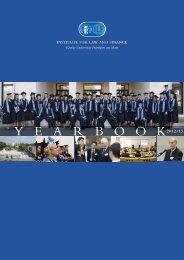
![R. Kiem Corporate_Finance_Summit_2012 [Kompatibilitätsmodus]](https://img.yumpu.com/22604282/1/190x135/r-kiem-corporate-finance-summit-2012-kompatibilitatsmodus.jpg?quality=85)
